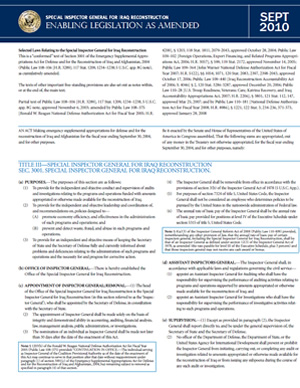 SIGIR 2010: Public Law
SIGIR 2010: Public Law
The National Defense Authorization Act for Fiscal Year 2008
The National Defense Authorization Act for Fiscal Year 2008 (P.L. 110–181), enacted January 28, 2008, provided (a) that SIGIR's audit and investigative oversight covered all spending for assistance for the reconstruction of Iraq regardless of the fiscal year for which it was appropriated, (b) that SIGIR, in consultation with the Inspectors General the Department of State, Defense and AID, develop a comprehensive plan for audits relating to Iraq, (c) that SIGIR should terminate only after less than $250 million in funds appropriated for the reconstruction of Iraq remains to be expended, and (d) that SIGIR should be able to continue to use certain special personnel authorities associated with temporary agencies. efforts in Iraq.
Legislative History
The Office of the Special Inspector General for Iraq Reconstruction (SIGIR) was created by Congress in 2003 as the Office of the Inspector General of the Coalition Provisional Authority (CPA–IG). (The CPA-IG was created by the Emergency Supplemental Appropriations Act for Defense and for the Reconstruction of Iraq and Afghanistan (P.L. 108–106, Section 3001), enacted November 6, 2003, in order to provide for independent and objective conduct and supervision of audits and investigations relating to the programs and operations of the Coalition Provisional Authority.)
The Ronald W. Reagan National Defense Authorization Act for Fiscal Year 2005 (P.L. 108–375), enacted October 28, 2004, redesignated the CPA-IG as SIGIR. SIGIR is headed by the Special Inspector General for Iraq Reconstruction (the "Inspector General"). Under Public Law 108-375, the Inspector General reports to and is under the general supervision of the Secretaries of State and Defense. In addition, the law extended SIGIR's audit and investigative authority to the use of amounts appropriated or otherwise made available to the Iraq Relief and Reconstruction Fund (IRRF). SIGIR's lifespan was extended so that its termination would occur ten months after 80 percent of amounts appropriated to the IRRF had been "obligated."
The Foreign Operations, Export Financing, and Related Programs Appropriations Act, 2006 (P.L. 109–102), enacted November 14, 2005, extended the duration of SIGIR's existence. This measure provided that SIGIR's termination should be based on the level of IRRF "expenditures," rather than on "obligations." Expenditures are monies that have been paid out; an obligation is a legal responsibility to eventually pay an amount. Terminating SIGIR on an obligation-based formula could have resulted in its termination occurring well before projects funded under those obligations could have been completed.
In October 2006, provisions affecting SIGIR oversight were included in the John Warner National Defense Authorization Act for Fiscal Year 2007 (P.L. 109–364), enacted October 17, 2006. SIGIR's audit and investigative oversight expanded to encompass all funds appropriated for Fiscal Year 2006 for the reconstruction of Iraq, regardless of how designated. SIGIR's termination was set for October 1, 2007.
Later in 2006, the Iraq Reconstruction Accountability Act of 2006 (P.L. 109–440) enacted December 20, 2006, repealed that part of Public Law 109-364 which amended SIGIR's termination provision. The law returned the termination formula so that SIGIR would go out of existence 10 months after 80 percent of the funds appropriated to the IRRF and to certain other programs (with respect to funds appropriated or otherwise made available for Fiscal Year 2006) have been expended. Public Law 109-440 also required SIGIR, prior to its termination, to prepare a final forensic audit report on the Iraq Relief and Reconstruction Fund (IRRF).
In 2007, the U.S. Troop Readiness, Veterans' Care, Katrina Recovery, and Iraq Accountability Appropriations Act, 2007 (P.L. 110–28), enacted May 25, 2007, further amended SIGIR's termination provision so that funds appropriated or otherwise made available in either of Fiscal Years 2006 or 2007 for the reconstruction of Iraq, no matter how they were designated, were to be taken into account in calculating whether the "80-percent-expended" test had been met.
The National Defense Authorization Act for Fiscal Year 2008 (P.L. 110–181), enacted January 28, 2008, provided (a) that SIGIR's audit and investigative oversight covered all spending for assistance for the reconstruction of Iraq regardless of the fiscal year for which it was appropriated, (b) that SIGIR, in consultation with the Inspectors General the Department of State, Defense and AID, develop a comprehensive plan for audits relating to Iraq, (c) that SIGIR should terminate only after less than $250 million in funds appropriated for the reconstruction of Iraq remains to be expended, and (d) that SIGIR should be able to continue to use certain special personnel authorities associated with temporary agencies.
